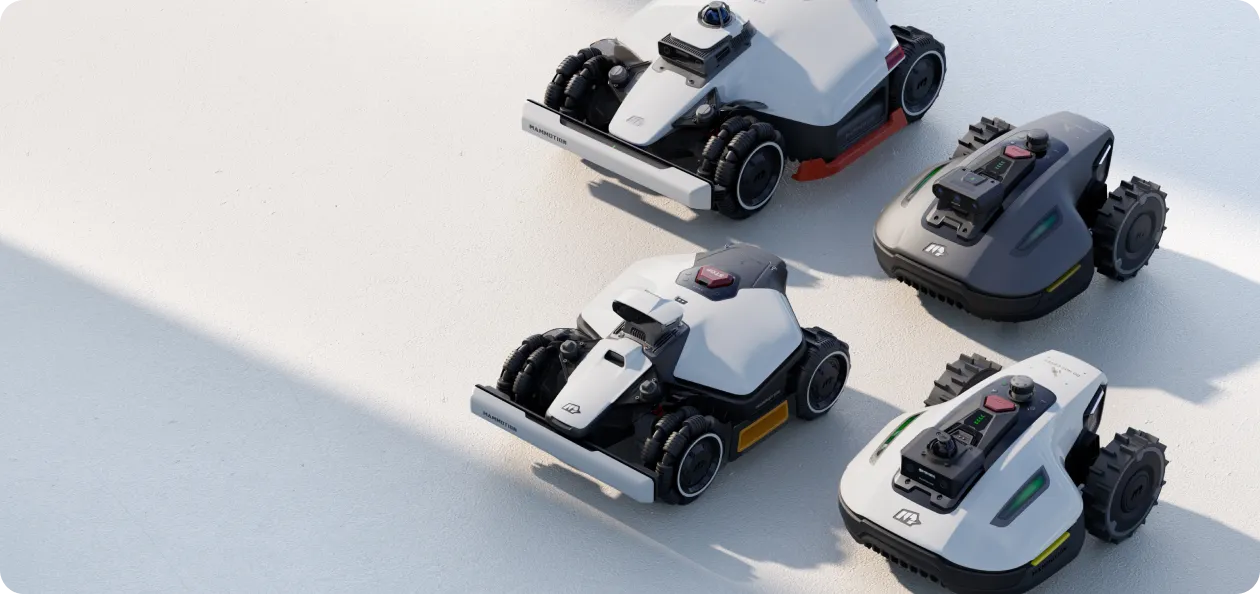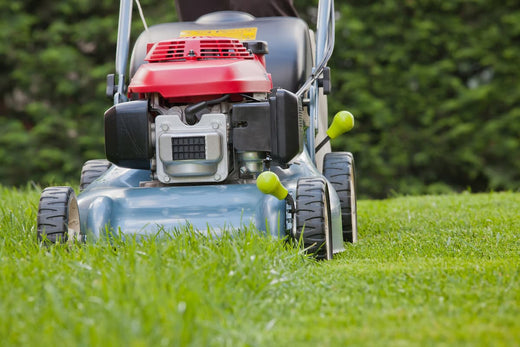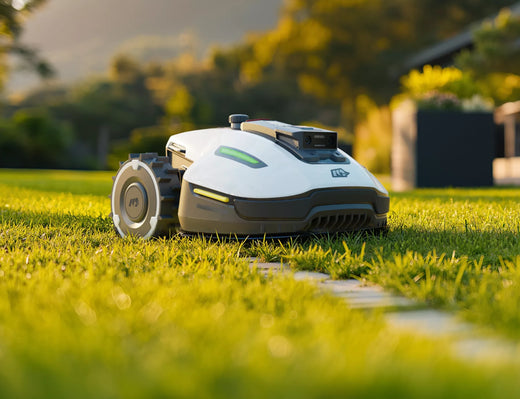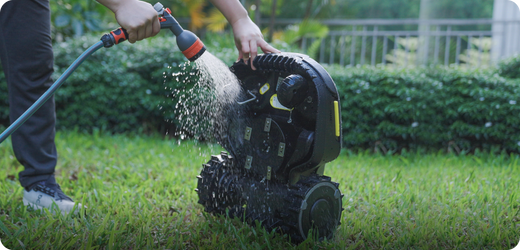Storing a lawn mower in the garage may seem simple, but improper storage can still lead to rust, fuel problems, battery damage, and safety risks. Many homeowners assume that parking the mower indoors is enough, yet garages often have moisture, temperature changes, and chemical exposure that can harm equipment over time. Proper preparation is just as important as the location itself.
This guide explains how to safely store a lawn mower in the garage, covering universal preparation steps, mower-type specific storage, moisture control, safety precautions, and spring startup tips—so your mower stays in top condition and starts easily when the next mowing season begins. (Will be a little different if you store a lawn mower in winter)
Is a Garage a Good Place to Store a Lawn Mower?
Yes, a garage is generally one of the best places to store a lawn mower, but only when the environment is properly managed.
Pros of Garage Storage
A garage offers solid protection from rain, snow, direct sunlight, and outdoor temperature extremes—all of which can cause rust, corrosion, and premature wear. Compared to outdoor storage, a garage also reduces exposure to pests, theft, and weather-related damage.
Potential Risks of Garage Storage
Many garages experience high humidity, poor ventilation, and condensation, especially in winter or during seasonal temperature changes. Moist air can settle on metal surfaces, leading to rust on mower decks, blades, fasteners, and internal components. Garages also commonly store chemicals such as fertilizers, paints, and solvents, whose vapors can accelerate corrosion and damage plastic or rubber parts.
When Garage Storage Is Ideal for Lawn Mowers
A garage is an ideal storage location when it is dry, well-ventilated, and relatively temperature-stable. Raising the mower off the concrete floor, keeping it away from chemicals, and improving airflow all greatly improve storage conditions. For battery-powered and robotic mowers, moderate temperatures and low humidity are especially important to protect sensitive electronics and batteries.
Safety Precautions Before Storing a Lawn Mower in the Garage
Before placing your lawn mower in the garage, basic safety steps must be taken to prevent fire hazards, electrical issues, and accidental injuries. Skipping these precautions can create serious risks, especially in enclosed indoor spaces.
1. Let the Engine Cool Completely
Never store a mower in the garage while the engine is still hot. A hot engine can ignite fuel vapors, dust, or nearby flammable materials. Always allow the mower to cool for at least 30–60 minutes after use before moving it indoors.
2. Disconnect Power Sources
For gas lawn mowers, disconnect the spark plug wire to prevent accidental starting while cleaning or moving the mower. This is a critical safety step, especially when working around the blade or underside. For electric mowers, unplug the power cord completely and ensure it is stored away from moisture. For battery-powered and robotic mowers, always remove the battery before storage to eliminate fire and electrical risks.
3. Handle Fuel Safely
Never store a mower with fuel leaks inside a garage. If you plan to keep fuel in the tank temporarily, ensure the fuel cap is tightly sealed and that there are no fumes present. Gasoline vapors are highly flammable and can ignite from small sparks or pilot lights. Any extra fuel should be stored only in approved fuel containers and kept far away from heaters or electrical equipment.
4. Keep Away From Flames and Heat Sources
Do not store your mower near water heaters, furnaces, dryers, welding equipment, or any appliance with an open flame or ignition source. Even a small spark can ignite fuel vapors. Always maintain a safe distance between the mower and any heat-producing equipment inside the garage.
5. Manage Battery Safety for Cordless and Robotic Mowers
Lithium-ion batteries must be stored in a dry area with stable temperatures. Avoid placing batteries on cold concrete floors or near flammable materials. Never charge damaged or swollen batteries, and do not leave batteries connected to chargers unattended for long periods in the garage.
Universal Pre-Storage Preparation (For All Lawn Mowers)
Before placing any lawn mower in the garage, proper preparation is essential to prevent rust, mechanical damage, and performance issues later. These steps apply to all mower types, including gas, electric, battery-powered, robotic, push, and riding mowers.
1. Thoroughly Clean the Mower
Remove all grass clippings, dirt, mud, and debris from the mower deck, wheels, discharge chute, and underside. Built-up organic matter holds moisture and promotes rust and corrosion. Use a brush, scraper, or low-pressure air blower. Avoid spraying water directly into engine or electrical areas.
2. Dry All Surfaces Completely
After cleaning, ensure the entire mower is fully dry. Even small amounts of trapped moisture can lead to corrosion during long storage periods. Wipe down metal surfaces with a dry cloth, paying special attention to blades, fasteners, and joints.
3. Inspect for Damage or Wear
Check for loose bolts, worn belts, cracked wheels, damaged cords, or bent blades. Addressing small issues before storage prevents them from becoming major repairs in the next season.
4. Lubricate Moving Parts
Apply light lubricant to wheel axles, pivot points, cables, and exposed metal components. This creates a protective barrier against moisture and prevents parts from seizing during extended inactivity.
5. Check and Service the Blade
Inspect the blade for dullness, nicks, or bends. Sharpening or replacing the blade before storage saves time in the spring and prevents uneven mowing.
6. Elevate the Mower if Possible
Place the mower on a mat, wood pallet, or lift to prevent direct contact with cold, damp concrete, which transfers moisture and accelerates rust.
How to Store Lawn Mowers in the Garage by Mower Type
Different types of lawn mowers require different storage methods. Following the correct steps for your specific mower type prevents fuel problems, battery failure, electrical damage, and mechanical wear.
1. Gas Lawn Mowers Garage Store
- Drain or Stabilize Fuel: Remove leftover fuel from the tank or add a fuel stabilizer and run the engine briefly to circulate it. This prevents carburetor clogs and fuel degradation.
- Change or Check Oil: Fresh oil protects the engine from corrosion during storage. Check the level and change if necessary.
- Clean Air Filter and Spark Plug: Inspect and clean or replace the air filter and spark plug to ensure easy startup in spring.
- Placement: Raise the mower off concrete floors using a mat or blocks to prevent moisture damage.
- Cover: Use a breathable cover to protect the mower from dust while allowing ventilation.
2. Electric / Corded Lawn Mowers Garage Store
- Inspect Power Cord: Check for cracks, frays, or exposed wires before storage.
- Protect from Moisture: Store the mower in a dry area, away from water or condensation.
- Coil Cord Properly: Loosely coil the cord to avoid internal damage.
- Indoor-Only Storage: Keep the mower indoors; never leave it outside for extended periods.
3. Battery-Powered (Cordless) Lawn Mowers Garage Store
- Remove Battery: Always take out the battery before storage.
- Store Battery at Moderate Temperature: Keep batteries indoors in a dry, temperature-stable area.
- Charge Battery to 40–70%: This range optimizes long-term battery health.
- Avoid Damp Garage Zones: Prevent moisture exposure that can damage electronics and battery cells.
4. Robotic Lawn Mowers Garage Store
- Bring Mower and Charging Base Indoors: Store both in a safe, dry space.
- Remove and Store Battery: Follow manufacturer instructions for battery storage.
- Clean Sensors and Underside: Remove debris to protect delicate components.
- Protect Boundary Wires from Rodents: Store wires safely to avoid chewing or damage.
Related Articles:
- Mammotion LUBA 2 AWD X Robot Lawn Mower Winter Maintenance
- Mammotion LUBA mini AWD Robot Lawn Mower Winter Maintenance
- Mammotion YUKA Robot Lawn Mower Winter Maintenance
- Mammotion YUKA mini Robot Lawn Mower Winter Maintenance
5. Riding Lawn Mowers Garage Store
- Stabilize or Drain Fuel: Prevent stale fuel issues and carburetor clogs.
- Disconnect Battery: Avoid accidental starts and preserve battery life.
- Change Oil and Filters: Clean oil and filters protect the engine during storage.
- Inflate Tires: Maintain proper tire pressure to prevent flat spots.
- Use Heavy-Duty Cover: Protect from dust, moisture, and small debris.
How to Control Moisture and Humidity in a Garage
Moisture and humidity are major threats to mowers stored in garages. Even indoor storage can lead to rust, corrosion, and battery degradation if the environment isn’t properly managed. Follow these steps to keep your garage safe for long-term mower storage.
Understand the Risks of Moisture
High humidity can cause metal parts like blades, decks, and fasteners to rust. Condensation may also damage electrical components in battery-powered or robotic mowers. Chemical vapors and stored liquids can accelerate corrosion if combined with moisture.
Improve Garage Ventilation
- Use Windows or Vents: Keep windows slightly open or use vents to allow airflow and reduce condensation. Proper circulation prevents trapped humidity around the mower.
- Consider a Small Fan: A low-power fan can improve air movement, drying any moisture on surfaces and reducing stagnant air.
Use Dehumidifiers or Moisture Absorbers
- Electric Dehumidifiers: These are ideal for garages prone to dampness. They keep humidity levels low and protect both metal and electronic components.
- Moisture Absorbers: Silica gel packs or moisture-absorbing containers placed near the mower can help reduce small amounts of residual humidity.
Prevent Concrete Moisture Transfer
Direct contact with cold concrete can draw moisture into metal parts. Elevate the mower using a mat, wooden pallet, or blocks. This simple step greatly reduces rust risk.
Avoid Storing Near Water Sources
Keep mowers away from water heaters, sinks, washing machines, or pipes that may leak. Even minor drips can lead to corrosion over months of storage.
Should You Use a Lawn Mower Cover in the Garage?
Using a cover can provide extra protection for your lawn mower, but it’s important to understand when and how to use one properly. The wrong type of cover or incorrect use can trap moisture and cause damage. (Are Lawn Mower Covers Worth It?)
When a Cover Is Necessary
- Dust Protection: Covers prevent dust and debris from settling on the mower, which can clog vents, blades, and moving parts.
- Pet and Pest Protection: Covers can keep pets from scratching the mower and help deter rodents from chewing wires or plastic parts.
When a Cover Can Cause Problems
- Moisture Trapping: Plastic or non-breathable covers can trap condensation, promoting rust and corrosion on metal surfaces.
- Heat Accumulation: Thick, non-ventilated covers may retain heat and damage batteries or plastic components in warm garages.
Features of a Good Garage Storage Cover
- Breathable Material: Allows airflow to prevent moisture buildup.
- Dust-Resistant: Keeps debris from settling on the mower.
- Correct Fit: Covers the mower completely without tight pressure that could scratch paint or bend controls.
- Lightweight and Easy to Remove: Makes seasonal access simple while minimizing wear.
Best Practices for Using a Cover
- Always clean and dry the mower before covering it.
- Avoid wrapping the cover too tightly; allow some airflow.
- Remove the cover periodically to inspect the mower and prevent trapped moisture.
How Long Can a Lawn Mower Be Safely Stored in a Garage?
Proper garage storage can keep your mower safe for months, but knowing how long different types can remain idle ensures you avoid damage and maintain performance.
Short-Term vs. Long-Term Storage
- Short-Term Storage: If storing between weekly uses, basic cleaning and covering are usually sufficient. The mower can remain in the garage for a few weeks without special preparation.
- Long-Term Storage: For seasonal storage, such as winter, more comprehensive preparation is required. Fuel stabilization, battery removal, lubrication, and moisture control are essential to prevent rust, corrosion, or battery degradation over several months.
Fuel and Engine Considerations
- Gasoline can degrade over 30–90 days. Use a stabilizer or drain fuel for storage longer than a month.
- Engines left idle with old fuel may develop carburetor clogs or varnish deposits, making spring startup difficult.
Battery-Powered Mowers
- Batteries can lose capacity if left fully charged or discharged for long periods. Store at 40–70% charge in a dry, moderate-temperature area.
- Cold temperatures can permanently reduce battery lifespan, so avoid unheated garages during winter when possible.
Recommended Storage Checks
- Inspect the mower every 1–2 months during long-term storage.
- Look for moisture buildup, rust, pests, or battery issues.
- Rotate or move the mower slightly to prevent pressure on tires or components that contact the floor.
Common Lawn Mower Garage Storage Mistakes to Avoid
Even when storing a lawn mower in a garage, homeowners often make mistakes that can reduce its lifespan or cause safety hazards. Avoiding these errors ensures your mower stays in top condition.
1. Storing with Untreated Fuel
- Leaving gas in the tank without a stabilizer can lead to stale fuel, carburetor clogs, and engine damage. Always drain fuel or use a stabilizer before long-term storage.
2. Leaving Batteries Connected
- Battery-powered and cordless mowers should have batteries removed. Leaving them connected can cause over-discharge, reduce lifespan, or create fire hazards in some cases.
3. Blocking Ventilation
- Placing the mower too close to walls or other equipment can trap moisture and restrict airflow, increasing the risk of rust and corrosion.
4. Storing Near Chemicals
- Keep mowers away from fertilizers, solvents, paints, or other chemicals whose fumes can damage plastic, rubber, or metal components.
5. Parking on Damp Concrete
- Direct contact with cold, damp concrete floors accelerates rust on decks, blades, and fasteners. Use a mat, pallet, or blocks to elevate the mower.
6. Ignoring Rodent Protection
- Garages can attract rodents that chew wires, hoses, and plastic components. Use rodent deterrents or keep the mower off the floor to reduce risk.
7. Improper Cover Usage
- Using a non-breathable cover can trap moisture, leading to rust and mold. Always choose a breathable cover and avoid tight wrapping.
Conclusion: Keep Your Lawn Mower Ready with Proper Garage Storage
Storing your lawn mower properly in a garage protects it from rust, corrosion, mechanical damage, and battery degradation. While garages provide shelter from weather and security benefits, simply parking a mower inside is not enough. Following a thorough preparation process—including cleaning, drying, lubricating, and elevating the mower—ensures long-term performance.
Different mower types require specific care: gas mowers need fuel stabilization or draining, electric and battery-powered mowers require safe battery storage, and robotic mowers need sensor cleaning and proper docking. Controlling moisture, using breathable covers, and avoiding chemical exposure further prolongs the life of your equipment.
By following these steps, you save money on repairs, reduce downtime, and ensure your mower is always ready to maintain a healthy, well-manicured lawn. Proper garage storage is a simple investment that maximizes the lifespan and reliability of your lawn mower.
Frequently Asked Questions
1. Can I leave gas in my lawn mower during storage?
It’s best to either drain the fuel tank completely or add a fuel stabilizer before storing your mower for more than a few weeks. Gasoline can degrade over time, leading to clogged fuel lines and engine problems. For short-term storage (under 4 weeks), keeping fuel in the tank with a tight cap is usually safe.
2. How should I store the battery of my electric or robotic lawn mower?
Remove the battery and store it in a cool, dry place at about 40–60% charge. Avoid extreme temperatures to prevent battery degradation or failure. Refer to your mower’s manual for specific battery care instructions.
3. What’s the ideal garage environment for storing a lawn mower?
Choose a dry, well-ventilated area away from direct sunlight and moisture. Elevate the mower off the floor if possible to prevent rust caused by floor dampness. Proper ventilation helps reduce condensation, protecting both gas and electric components.
4. How often should I check on my mower during long-term storage?
It’s recommended to inspect your stored mower at least once a month. Check for signs of moisture, rust, pests, or leaks, and ensure the battery (if removed) remains at the proper charge level.
5. Is it necessary to cover my lawn mower in the garage?
Yes, using a protective cover designed for lawn mowers helps keep dust, moisture, and accidental spills off your equipment. It also prevents scratches and reduces the risk of damage to delicate parts.
6. How can I prepare my robotic lawn mower for winter storage?
Remove and properly store the battery, clean all sensors, disconnect the charging dock if possible, and update the mower’s firmware. Storing the mower indoors in a dry, temperature-controlled space is ideal.
















